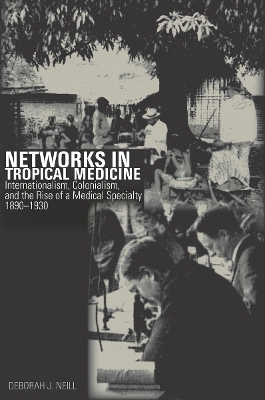
Networks in Tropical Medicine
Internationalism, Colonialism, and the Rise of a Medical Specialty, 1890–1930
Seiten
2012
Stanford University Press (Verlag)
978-0-8047-7813-8 (ISBN)
Stanford University Press (Verlag)
978-0-8047-7813-8 (ISBN)
- Lieferbar (Termin unbekannt)
- Versandkostenfrei innerhalb Deutschlands
- Auch auf Rechnung
- Verfügbarkeit in der Filiale vor Ort prüfen
- Artikel merken
This book explores the transnational character of tropical medicine as it was practiced in Europe and Africa in the late nineteenth and early twentieth centuries.
Networks in Tropical Medicine explores how European doctors and scientists worked together across borders to establish the new field of tropical medicine in the late nineteenth and early twentieth centuries. The book shows that this transnational collaboration in a context of European colonialism, scientific discovery, and internationalism shaped the character of the new medical specialty. Even in an era of intense competition among European states, practitioners of tropical medicine created a transnational scientific community through which they influenced each other and the health care that was introduced to the tropical world. One of the most important developments in the shaping of tropical medicine as a specialty was the major sleeping sickness epidemic that spread across sub-Saharan Africa at the turn of the century. The book describes how scientists and doctors collaborated across borders to control, contain, and find a treatment for the disease. It demonstrates that these medical specialists' shared notions of "Europeanness," rooted in common beliefs about scientific, technological, and racial superiority, led them to establish a colonial medical practice in Africa that sometimes oppressed the same people it was created to help.
Networks in Tropical Medicine explores how European doctors and scientists worked together across borders to establish the new field of tropical medicine in the late nineteenth and early twentieth centuries. The book shows that this transnational collaboration in a context of European colonialism, scientific discovery, and internationalism shaped the character of the new medical specialty. Even in an era of intense competition among European states, practitioners of tropical medicine created a transnational scientific community through which they influenced each other and the health care that was introduced to the tropical world. One of the most important developments in the shaping of tropical medicine as a specialty was the major sleeping sickness epidemic that spread across sub-Saharan Africa at the turn of the century. The book describes how scientists and doctors collaborated across borders to control, contain, and find a treatment for the disease. It demonstrates that these medical specialists' shared notions of "Europeanness," rooted in common beliefs about scientific, technological, and racial superiority, led them to establish a colonial medical practice in Africa that sometimes oppressed the same people it was created to help.
Deborah Neill is Assistant Professor of History at York University.
| Zusatzinfo | 1 map, 9 figures |
|---|---|
| Verlagsort | Palo Alto |
| Sprache | englisch |
| Maße | 152 x 229 mm |
| Gewicht | 544 g |
| Themenwelt | Geisteswissenschaften ► Geschichte ► Regional- / Ländergeschichte |
| Medizin / Pharmazie ► Gesundheitswesen | |
| Medizin / Pharmazie ► Medizinische Fachgebiete ► Mikrobiologie / Infektologie / Reisemedizin | |
| Studium ► Querschnittsbereiche ► Geschichte / Ethik der Medizin | |
| ISBN-10 | 0-8047-7813-2 / 0804778132 |
| ISBN-13 | 978-0-8047-7813-8 / 9780804778138 |
| Zustand | Neuware |
| Haben Sie eine Frage zum Produkt? |
Mehr entdecken
aus dem Bereich
aus dem Bereich
Die Geschichte eines Weltzentrums der Medizin von 1710 bis zur …
Buch | Softcover (2021)
Lehmanns Media (Verlag)
17,95 €
von der Antike bis zur Gegenwart
Buch | Softcover (2024)
C.H.Beck (Verlag)
12,00 €
Krankheitslehren, Irrwege, Behandlungsformen
Buch | Softcover (2024)
C.H.Beck (Verlag)
39,95 €


